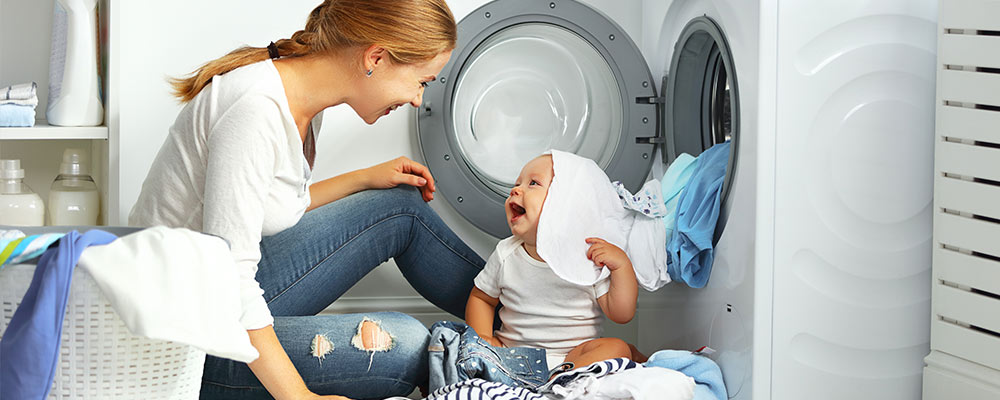Optimize Your Appliances
Appliances contribute to your monthly utility bill no matter how energy efficient they may be. By following the tips below, minimizing the impact they have on your bill is simple.

Refrigerators
According to energystar.gov, more than 60 million refrigerators in the United States are over 10 years old costing consumers $4.7 billion a year in energy costs. By replacing a refrigerator that is 10 years or older with a new ENERGY STAR® certified one, you could save up to $300 on energy costs over its lifetime.
- Set the temperature of your refrigerator to 35°-38° and your freezer to 0°.
- Open and close your refrigerator as needed, do not leave the doors open while loading groceries.
- Keep your freezer as full as possible, the frozen items help maintain the cold temperature and will reduce your freezer's workload.
- Check the rubber seals on your refrigerator and freezer doors, if cold air is seeping out of dry or cracked seals the refrigerator will need to run more to keep the inside contents cold.
- If you have an extra refrigerator or freezer that are rarely used, consider recycling them.
Duval,
St. Johns, and
Clay Counties all offer curbside pick up by scheduling a pick-up.
Dishwashers
Replacing a dishwasher that was made before 1994 with a new ENERGY STAR certified dishwasher could save you up to 1,600 gallons of water over it's lifetime. Dishwashers made before 1994 waste more than 10 gallons of water per cycle.
- Scrape dishes clean instead of rinsing them before loading them in the dishwasher.
- Only run your dishwasher when it is full, the same amount of water and electricity is used no matter how full it is.
- Use the air dry option if available or use a rag to wipe dishes dry after they have been cleaned.
- If available, use the energy-saving cycle to shorten wash time and to save water.
Stovetops and Ovens
- When cooking multiple items, prepare items so they can cook in the oven at the same time.
- Pre-cut and season meats and vegetables before turning on your stovetop or oven so you do not waste time with preparations when they are ready for use.
- Use the proper size pan while cooking on your stovetop, heat is wasted if you are using a smaller pan than burner.
- Consider using lids or covering pans while cooking, your food will cook faster and keeps the kitchen cooler.
- Use a crock-pot, toaster oven, or microwave for cooking. They use less electricity and add less heat to your kitchen.
- If you use the self-cleaning option on your oven, try to use it no more than once per month and start it when your oven is already hot.
Clothes Washers and Dryers
Replacing a clothes dryer 10 years or older with a new ENERGY STAR certified clothes dryer will save you about $25 a year on home energy bills? Sensors inside the new machines turn the dryers off when your clothes are dry, thus helping you save.
- Use cold water for washing and only wash full loads of laundry.
- If available, use the quick wash or small load cycle when appropriate, these options will shorten run times and use less water.
- Clean the dryer's lint trap before each use.
- Do not overload the dryer.
- If available, use the auto sensor option to avoid over drying.
- Air dry clothes if possible.
Hot Water Heaters
- Set your hot water thermostat to 120°.
- Consider adding a water heater timer that turns your water heater off at night or during times you do not use it.
- Insulate any accessible hot water pipes and the cold water supply line near the tank.
- Consider installing heat traps on your water heater tank if they are not already installed.
Purchasing New Appliances
When your appliances reach the end of their life, it is important to know your options when purchasing replacements.
- Look for ENERGY STAR certified appliances, they will help you save more electricity and water than non-certified models.
- Compare operating costs and electricity use of appliances by using the EnergyGuide label.
- Select the right size appliance. Purchasing a refrigerator or water heater that is too big will require additional electricity to cool or heat the unneeded space.
- Find appliances with energy-saving options or that have extra options that allow you to choose cycles that are most appropriate for your needs.
- Recycle your old appliances, keeping an old refrigerator as extra storage will cause your electricity consumption to increase.
Explore Solutions and Save
Learn about all the ways JEA helps Northeast Florida families, businesses and our community thrive and how we can help you do more.
Related Links
-
Seasonal Tips
Whether you're looking for a perfect gift or trying to find tips to conserve energy and water while hosting family and friends in town - we've got what you need to enjoy the holidays.
-
Managing Consumption
Managing your energy and water consumption is your first step to bringing your utility bill under control. Our tools can help you do just that.